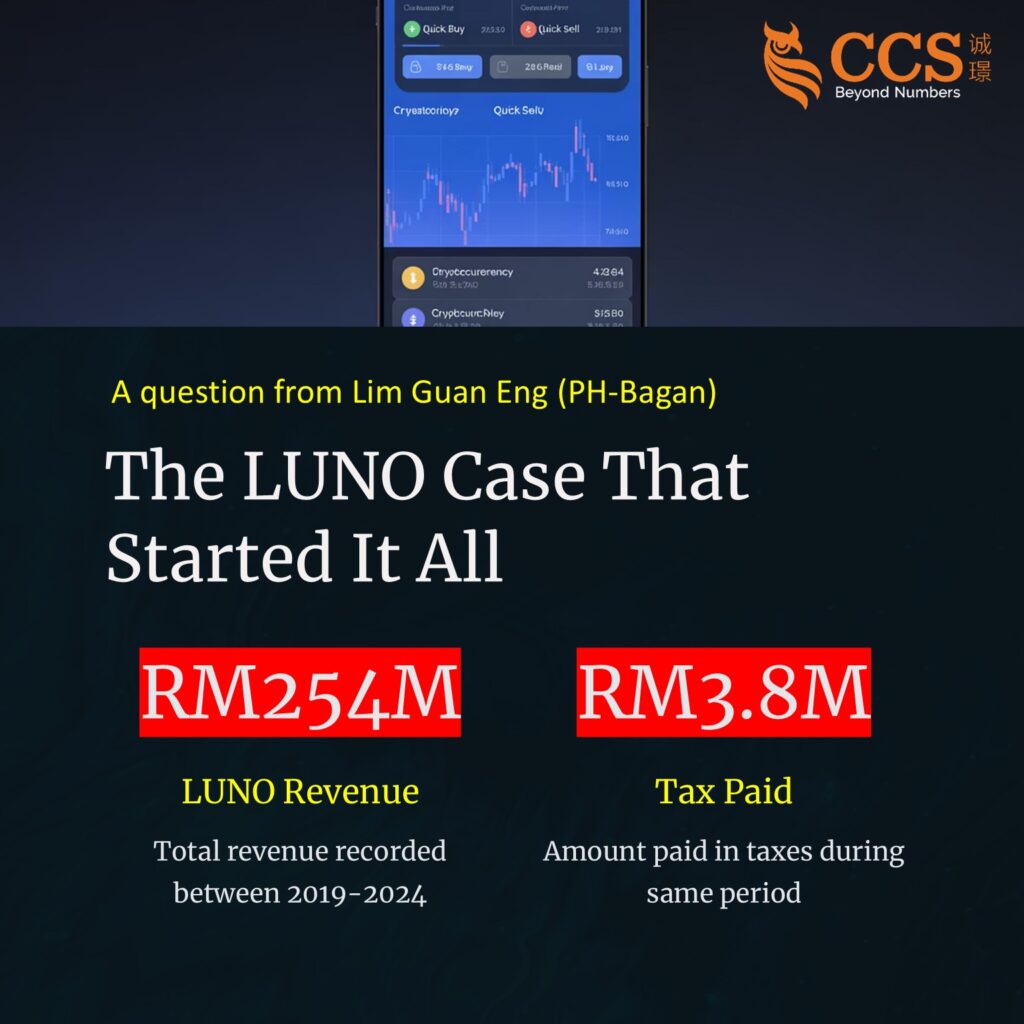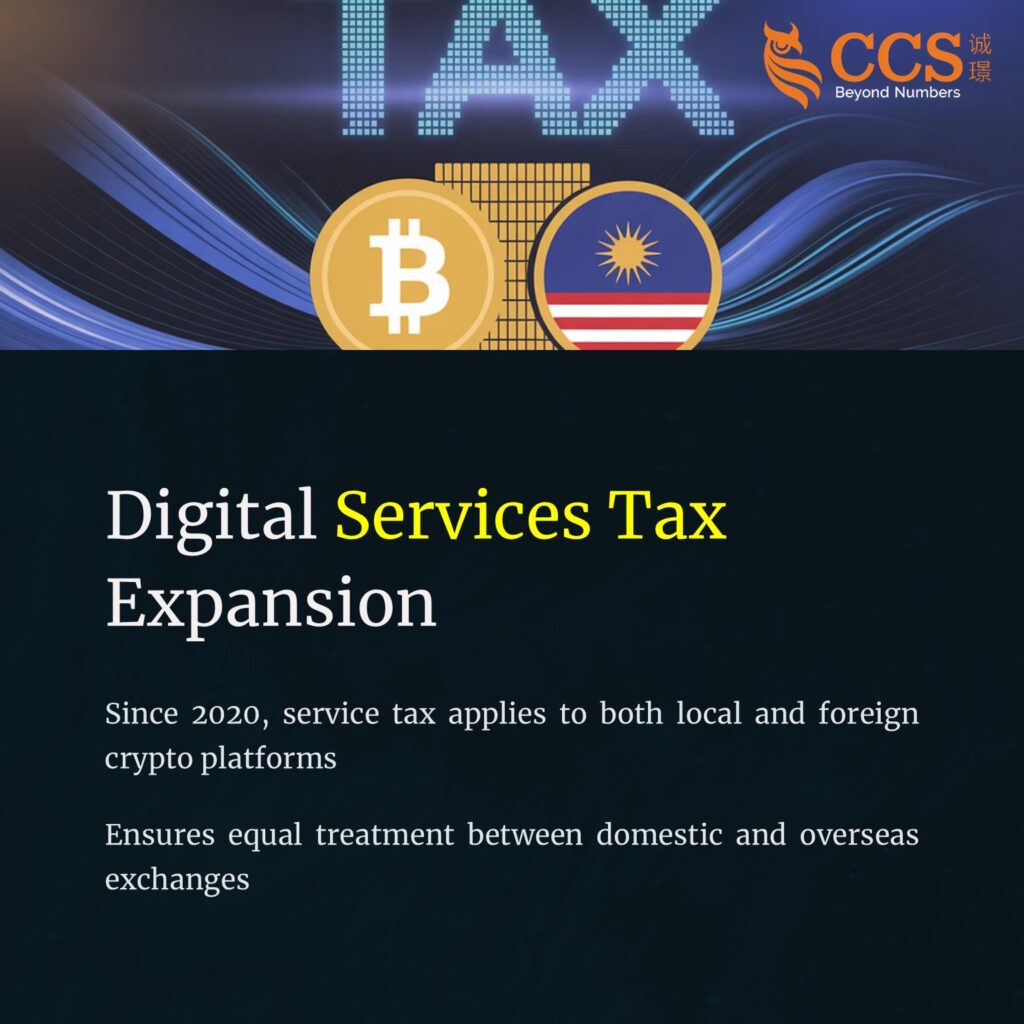













![]()
![]() Malaysia’s Crypto Tax Framework: What Every Investor and Business Must Know
Malaysia’s Crypto Tax Framework: What Every Investor and Business Must Know
Introduction to Malaysia’s Crypto Tax Landscape
Malaysia’s approach to cryptocurrency and digital assets has undergone significant evolution in recent years.
The Inland Revenue Board of Malaysia (LHDN/IRBM) and the Securities Commission (SC) have both taken progressive steps to ensure clarity in taxation, compliance, and investor protection.
As digital assets continue to gain traction in trading, investment, and business operations, understanding the tax treatment of cryptocurrencies in Malaysia has never been more important.
![]() Is Cryptocurrency Legal in Malaysia?
Is Cryptocurrency Legal in Malaysia?
Cryptocurrency is not recognised as legal tender in Malaysia, but it is not illegal to own, trade, or invest in digital assets.
Instead, crypto assets fall under the category of securities and digital tokens when issued or traded through regulated platforms licensed by the SC.
This means that while you cannot use Bitcoin to pay for groceries, you can legally trade it through recognised exchanges.
![]() Tax Treatment of Cryptocurrency in Malaysia
Tax Treatment of Cryptocurrency in Malaysia
![]() 1. Income Tax on Crypto Transactions
1. Income Tax on Crypto Transactions
![]() Trading and Business Activity:
Trading and Business Activity:
Suppose an individual or business engages in frequent cryptocurrency trading, mining, or providing cryptocurrency-related services.
In that case, profits are treated as business income and are subject to income tax (current corporate tax rate: 24%).
![]() Occasional or Passive Holding:
Occasional or Passive Holding:
Gains from occasional trading may fall outside the income tax net, but IRBM applies the “badges of trade” test to determine whether the activity constitutes a business.
![]() 2. Capital Gains Tax (CGT)
2. Capital Gains Tax (CGT)
Malaysia historically did not impose CGT on financial assets.
However, from 1 January 2024, Capital Gains Tax (CGT) applies to the disposal of unlisted shares in Malaysia.
While crypto is not explicitly categorized under this rule, future reforms may extend CGT to certain classes of digital assets.
![]() 3. Withholding Tax on Cross-Border Crypto Services
3. Withholding Tax on Cross-Border Crypto Services
Payments made to non-residents for crypto-related services (such as blockchain consultancy, software licensing, or platform fees) may trigger withholding tax obligations under the Income Tax Act.
![]() 4. Sales and Service Tax (SST) Implications
4. Sales and Service Tax (SST) Implications
Crypto exchanges and wallet providers offering services in Malaysia may fall under service tax (8%), especially where services qualify under Group G (digital services).
![]() Key Compliance Obligations for Crypto Investors
Key Compliance Obligations for Crypto Investors
1. Keep Accurate Records
Investors must maintain detailed records of transactions, including acquisition cost, disposal value, date, and counterparties.
2. Declare in Tax Returns
Crypto-derived income must be declared in annual tax filings under “Other Income” or “Business Income”, depending on activity.
3. Observe Anti-Money Laundering (AML) Rules
Licensed exchanges are required to perform KYC/AML checks, and failure to report suspicious transactions could expose investors to penalties.
![]() Regulatory Bodies Governing Crypto in Malaysia
Regulatory Bodies Governing Crypto in Malaysia
Securities Commission Malaysia (SC) – Oversees Initial Exchange Offerings (IEOs), Digital Asset Exchanges (DAX), and custodians.
Bank Negara Malaysia (BNM) – Regulates anti-money laundering aspects through the **Digital Currencies Policy Document**.
Inland Revenue Board of Malaysia (IRBM) – Manages tax compliance for crypto-related income and gains.
![]()
![]() Challenges in Crypto Tax Compliance
Challenges in Crypto Tax Compliance
1. Unclear Classification – Lack of specific tax legislation for digital assets leads to reliance on existing general tax principles.
2. Valuation Issues – Determining fair market value at the time of transaction requires reliable exchange data.
3. Cross-Border Complexity – Transactions with overseas platforms raise dual-taxation and reporting risks.
![]() Best Practices for Crypto Investors and Businesses
Best Practices for Crypto Investors and Businesses
![]() Use licensed exchanges recognized by the SC.
Use licensed exchanges recognized by the SC.
![]() Maintain comprehensive transaction logs for tax audit readiness.
Maintain comprehensive transaction logs for tax audit readiness.
![]() Seek professional advice on structuring crypto holdings to optimize tax exposure.
Seek professional advice on structuring crypto holdings to optimize tax exposure.
![]() Stay updated with IRBM guidelines and potential new legislation.
Stay updated with IRBM guidelines and potential new legislation.
![]()
![]() Conclusion
Conclusion
Malaysia’s taxation of cryptocurrencies is an evolving field that blends elements of income tax, service tax, and international compliance.
While there is no explicit “crypto tax act” yet, existing tax rules already cover most scenarios for investors and businesses.
Those engaging in crypto-related activities must be proactive in reporting, record-keeping, and compliance to avoid penalties and to future-proof their digital asset strategy.
In the fast-changing world of blockchain and digital finance, staying informed is the best investment.
![]()
![]() 马来西亚加密货币税收框架:每位投资者与企业必知要点
马来西亚加密货币税收框架:每位投资者与企业必知要点
马来西亚加密货币税收环境概述
近年来,马来西亚对加密货币及数字资产的监管政策经历了重大演变。
马来西亚内陆税收局(LHDN/IRBM)与证券委员会(SC)均采取了前瞻性措施,以确保税收政策、合规要求及投资者保护的明确性。
随着数字资产在交易、投资及商业运营中持续升温,理解马来西亚加密货币的税务处理方式变得至关重要。
![]() 加密货币在马来西亚是否合法?
加密货币在马来西亚是否合法?
加密货币在马来西亚不被视为法定货币,但持有、交易或投资数字资产并不违法。
当加密资产通过SC许可的受监管平台发行或交易时,其性质属于证券及数字代币范畴。
这意味着虽然无法用比特币支付日常购物,但通过正规交易所进行交易完全合法。
![]() 马来西亚加密货币税务处理
马来西亚加密货币税务处理
![]() 1. 加密交易所得税
1. 加密交易所得税
![]() 交易与商业活动:
交易与商业活动:
若个人或企业频繁从事加密货币交易、挖矿或提供相关服务,
则相关利润将被视为商业收入,需缴纳所得税(现行企业税率:24%)。
![]() 偶发性或被动持有:
偶发性或被动持有:
偶发性交易所得可能不纳入所得税征管范围,但马来西亚税务局将采用“商业特征测试”判定该行为是否构成经营活动。
![]() 2. 资本利得税(CGT)
2. 资本利得税(CGT)
马来西亚历来不对金融资产征收资本利得税。
但自2024年1月1日起,处置马来西亚境内非上市股票将适用资本利得税(CGT)。
尽管加密货币未被明确纳入该规则,未来改革可能将CGT扩展至特定类别的数字资产。
![]() 3. 跨境加密服务预扣税
3. 跨境加密服务预扣税
根据《所得税法令》,向非居民支付的加密相关服务款项(如区块链咨询、软件许可或平台费用)可能触发预扣税义务。
![]() 4. 销售与服务税(SST)影响
4. 销售与服务税(SST)影响
在马来西亚提供服务的加密交易所及钱包供应商可能需缴纳服务税(8%),尤其当服务符合G组(数字服务)标准时。
![]() 加密投资者关键合规义务
加密投资者关键合规义务
1. 保存准确记录
投资者须详细记录交易信息,包括购入成本、处置价值、日期及交易对手方。
2. 纳税申报
加密货币所得须在年度纳税申报中申报,具体归类为“其他收入”或“营业收入”,视业务性质而定。
3. 遵守反洗钱(AML)规则
持牌交易所必须执行KYC/AML核查,未报告可疑交易可能导致投资者面临处罚。
![]() 马来西亚加密货币监管机构
马来西亚加密货币监管机构
马来西亚证券委员会(SC)——监管首次交易所发行(IEO)、数字资产交易所(DAX)及托管机构。
马来西亚国家银行(BNM)——通过《数字货币政策文件》实施反洗钱监管。
马来西亚内陆税收局(IRBM)——管理加密货币相关收入与收益的税务合规。
![]()
![]() 加密货币税务合规挑战
加密货币税务合规挑战
1. 分类模糊——缺乏针对数字资产的专项税法,导致需依赖现有通用税务原则。
2. 估值难题——交易时点公允价值的确定需依赖可靠的交易所数据。
3. 跨境复杂性——与海外平台交易引发双重征税及申报风险。
![]() 加密投资者与企业的最佳实践
加密投资者与企业的最佳实践
![]() 使用获SC认可的持牌交易所。
使用获SC认可的持牌交易所。
![]() 完整保存交易记录以备税务审计。
完整保存交易记录以备税务审计。
![]() 寻求专业建议优化加密资产持有结构以降低税务风险。
寻求专业建议优化加密资产持有结构以降低税务风险。
![]() 及时掌握IRBM指南及潜在新法规动态。
及时掌握IRBM指南及潜在新法规动态。
![]()
![]() 结论
结论
马来西亚加密货币征税体系正处于融合所得税、服务税及国际合规要素的演进阶段。
尽管尚未出台明确的《加密货币税法令》,现行税法已涵盖投资者与企业的大多数操作场景。
从事加密相关活动者必须主动履行申报、记录保存及合规义务,以规避处罚并确保数字资产策略的未来适应性。
在区块链与数字金融快速发展的领域,保持信息敏锐度才是最明智的投资。






